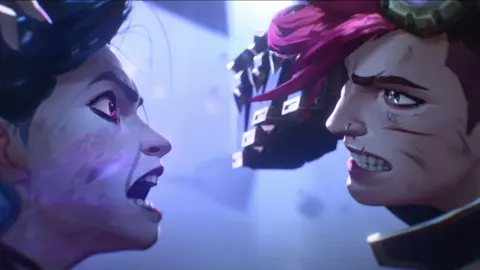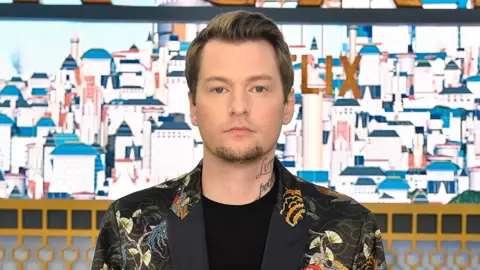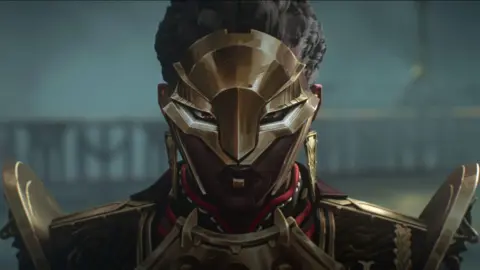[ad_1]
By Andrew Rogers & Tom Richardson, BBC Newsbeat
 Netflix
Netflix“We’ve all watched TV shows that didn’t really know when to stop,” says Christian Linke.
“We don’t want to be one of those.”
Quitting while you’re ahead isn’t always a strength of the TV industry, and there are plenty of examples of programmes “jumping the shark” and overstaying their welcome.
But ending a show on your own terms after just two seasons is relatively unusual.
That’s especially true when you’re the showrunner of Arcane – the award-winning animated story inspired by multiplayer online game League of Legends (LoL).
It follows the fates of sisters Vi and Jinx, who find themselves on opposing sides of a war.
Pitch Perfect star Hailee Steinfeld and Ella Purnell – who recently starred in Amazon’s Fallout series – provided the pair’s voices.
Their performances and the show’s striking animation by French studio Fortiche drew huge praise, winning Arcane an Emmy and sweeping the board at “cartoon Oscars” the Annies.
It remains one of Netflix’s highest-rated original shows and, in some people’s eyes, the best video game adaptation ever made.
So when the trailer for season two dropped earlier this week and revealed it would be the “final chapter”, some fans were surprised.
But showrunner Christian, who works for LoL developer Riot Games, insists it was always the plan.
“We want to just tell a very specific story where we have a very tailored ending in mind,” he tells BBC Newsbeat.
Christian admits he might do things differently now if he started over, knowing how well season one was received.
“But this is just what we built from the beginning,” he says.
“And so we have to kind of follow our gut on this and tell the story that it was supposed to be.”
 Getty Images
Getty ImagesThe first season of Arcane hit Netflix’s Top 10 list in 83 countries worldwide in the month of its release.
League of Legends is one of the most popular games in the world by player count, and is massive in the esports scene.
Its annual Worlds contest – reminiscent of an Olympics or football-style event – is being held at London’s O2 this year.
Christian says getting a TV show made in an industry that’s “afraid to have a big blunder” is difficult, and a similar series with “high quality animation” at its core didn’t exist at the time.
But he says having such a big fanbase for the game gave Arcane’s creators confidence.
“It was very clear that just because it doesn’t exist, it doesn’t mean this huge audience of gamers didn’t want to see these characters and these worlds realised in a big way.
“It was just obvious to us. It wasn’t any secret formula. It was just doing the thing that everyone obviously wanted.”
 Netflix
NetflixDespite being the creator of one of the world’s most-played online titles, Riot Games has had a troubled few years.
The California-based company paid out compensation to female employees last year as the result of a multimillion-dollar lawsuit over sexual discrimination lodged in 2018.
And earlier this year it laid off 530 staff, with CEO Dylan Jadeja saying it had made some “big bets” in its attempts to expand outside gaming that hadn’t gone to plan.
Christian, who joined Riot as a music composer in 2010, says the Arcane project wasn’t affected too much, and remains a small team of about 20 people.
But he admits that seeing colleagues he’d worked with for years leaving was “really painful”.
“I think the pandemic had everyone just kind of think, ‘Oh, I guess everyone’s just gonna stay at home forever and play games all day, and that’ll surely not change at all’,” he says.
“So I think the industry just had to wake up.”
Christian says the situation in the industry has forced companies to ask themselves hard questions and “have really good answers” to them, focusing on creating “truly great stuff and not just more of the same”.
Fans won’t be getting more of Arcane’s story after season 2, but Christian says there are plans for further shows based on LoL featuring more of the game’s 167 playable characters.
Despite wider troubles in the industry there is a big appetite for videogame adaptations.
They’ve turned around their reputation for being low quality and are becoming increasingly in demand after a string of high-profile successes.
Christian says he’d love to see his childhood favourites – Warcraft and Starcraft, from developer Blizzard – getting the TV series treatment.
And he hopes the success of Arcane will inspire other creators to avoid “just trying to fit into Hollywood and really find our own path”.
“We really just tried to stay true to what our game feels like, what our tone is,” he says.
“We should preserve videogames. They’re different. And that’s OK. And that’s why they’re so cool. So let’s embrace it.”

[ad_2]
Source link




